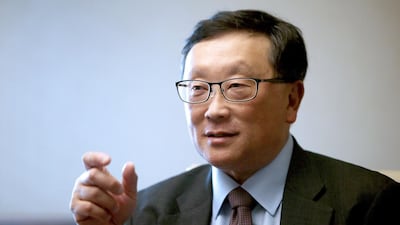By this point, you have to wonder if there is something in the water at BlackBerry’s headquarters in Canada.
In an exclusive interview with The National last week, chief executive John Chen revealed that his company is going to release two new devices in 2016 - one with the famous BlackBerry keyboard and another that's all touchscreen, both running Google's Android operating system.
Pretty much everyone is now wondering, if they haven’t already been doing so for some time, why BlackBerry is bothering. The company should have thrown in the towel on phones and focused its attention on software long ago, yet still it soldiers on to continually diminishing returns.
The depth and speed of BlackBerry’s fall has been almost unprecedented.
In 2007, the company was riding high as the pioneer of the smartphone market. Corporate executives, celebrities and even heads of state were glued to their “Crackberries.” BlackBerry hit a peak market capitalisation of $69 billion (Canadian) on the Toronto Stock Exchange and, for a time, it was the most valuable company in Canada.
But executives met the iPhone’s arrival with a shocking degree of hubris. Then co-chief executive officers Jim Balsillie and Mike Lazaridis derided Apple’s effort, believing no one would want a touchscreen phone and that their device was superior.
How wrong they were. Just a few short years later, Apple was dominating, followed by Google via multiple manufacturers. BlackBerry had badly misjudged consumers’ desire for large touchscreens and apps that did everything from display movie times to deliver pizza.
The company’s market share has plummeted from a world-leading 20 per cent to less than one per cent as a result. In late 2013, Mr. Chen, who previously turned around software vendor Sybase, was brought in to do the same at BlackBerry. The company he inherited was a shadow of its former self, with its market cap at around C$3 billion.
The BlackBerry Priv, finally released in the UAE in January, was supposed to be the company’s saviour. Running Android, it had all the apps people wanted, plus the iconic keyboard that made BlackBerry a force to begin with. It was also touted as the most secure Android phone, since it had the company’s vaunted privacy features built in.
None of it mattered. The Priv flopped hard, with BlackBerry selling only 600,000 total devices in the three months to the end of March, well below analyst estimates of 850,000. By comparison, Apple sold nearly 75 million iPhones in its most recent quarter.
In his interview with The National, Mr. Chen admitted the Priv was too expensive. “A lot of enterprise customers have said to us, ‘I want to buy your phone but $700 (US) is a little too steep for me. I’m more interested in a $400 device’.”
The next two Android phones will thus be aimed mid-market, but that is also proving to be a moving target. By the time BlackBerry has a $400 Android device, the mid-market is likely to have shifted even lower.
Samsung, the world’s largest phone maker, has seen the average selling price of its phones drop to US$343 in 2015 from nearly US$500 in 2010. Even Apple has experienced slowing sales thanks to a saturating market, prompting last month’s release of the cheaper iPhone SE.
With trajectories like that, BlackBerry’s desire to continue making phones looks more nonsensical by the day, especially when its software and services revenue more than doubled in its latest quarter to US$153 million year-over-year. For the full year, that revenue surged 113 per cent to US$527 million.
It could be that Mr. Chen is trying to buy time for the software business to continue building momentum with stopgap handsets. But with the number of BlackBerry faithful quickly approaching zero and the company spending dwindling resources on developing those devices, it’s clear he’s wasting time - not buying it.
Despite his history with turnarounds, Mr. Chen simply hasn’t delivered with BlackBerry. Overall revenue has fallen from US$11 billion in 2013 to just over $2.1bn in the fiscal year that ended in February, while the stock price has not left its doldrums during his tenure.
The company has been shedding almost as many employees as customers, with the latest round of 200 job cuts coming two months ago. With its continuing poor performance and an insistence on sticking with a failed formula, BlackBerry might want to consider shedding one more employee.
Peter Nowak is a veteran technology writer and the author of Humans 3.0: The Upgrading of the Species.
business@thenational.ae
Follow The National's Business section on Twitter

